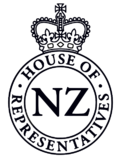List of holders
The following individuals held the office of leader of the Legislative Council. [1]
- Key
Independent Liberal Reform United Labour National
| No. | Name | Portrait | Term of Office | Government | |||
|---|---|---|---|---|---|---|---|
| 1 | Frederick Whitaker |  | 12 May 1856 | 24 May 1856 | Sewell | ||
| Fox I | |||||||
| 2 | Ralph Richardson |  | 24 May 1856 | 2 June 1856 | |||
| (1) | Frederick Whitaker |  | 2 June 1856 | 16 July 1861 | Stafford I | ||
| Fox II | |||||||
| 3 | Daniel Pollen |  | 16 July 1861 | 6 August 1862 | |||
| 4 | Henry Tancred |  | 6 August 1862 | 2 November 1863 | Domett | ||
| Whitaker I | |||||||
| (1) | Frederick Whitaker |  | 2 November 1863 | 24 November 1864 | |||
| 5 | Henry Sewell |  | 24 November 1864 | 26 July 1865 | Weld | ||
| 6 | James Crowe Richmond |  | 26 July 1865 | 17 October 1865 | |||
| 7 | Andrew Russell |  | 17 October 1865 | July 1866 | Stafford II | ||
| 8 | John Johnston |  | July 1866 | July 1867 | |||
| 9 | John Richardson |  | July 1867 | July 1868 | |||
| (3) | Daniel Pollen |  | July 1868 | 2 July 1869 | |||
| Fox III | |||||||
| 10 | William Gisborne |  | 2 July 1869 | 10 September 1872 | |||
| (5) | Henry Sewell |  | 10 September 1872 | 11 October 1872 | Stafford III | ||
| 11 | George Waterhouse |  | 11 October 1872 | 15 July 1873 | Waterhouse | ||
| Fox IV | |||||||
| Vogel I | |||||||
| (3) | Daniel Pollen |  | 15 July 1873 | 16 October 1877 | |||
| Pollen | |||||||
| Vogel II | |||||||
| Atkinson I, II | |||||||
| 12 | George Stoddart Whitmore |  | 16 October 1877 | 8 October 1879 | Grey | ||
| (1) | Frederick Whitaker |  | 8 October 1879 | 4 June 1884 | Hall | ||
| Whitaker II | |||||||
| Atkinson III | |||||||
| 13 | Richard Oliver |  | 4 June 1884 | 19 August 1884 | |||
| (12) | George Stoddart Whitmore |  | 19 August 1884 | 29 August 1884 | Stout–Vogel | ||
| 14 | George McLean |  | 29 August 1884 | 4 September 1884 | Atkinson IV | ||
| 15 | Patrick Buckley |  | 4 September 1884 | 11 October 1887 | Stout–Vogel | ||
| (1) | Frederick Whitaker |  | 11 October 1887 | 27 January 1891 | Atkinson V | ||
| (15) | Patrick Buckley |  | 27 January 1891 | 11 June 1896 | Liberal | ||
| 16 | William Campbell Walker |  | 11 June 1896 | 29 June 1903 | |||
| 17 | Albert Pitt |  | 29 June 1903 | 27 June 1907 | |||
| 18 | John Findlay |  | 27 June 1907 | 1 August 1911 | |||
| 19 | James McGowan |  | 1 August 1911 | 29 August 1911 | |||
| (18) | John Findlay |  | 29 August 1911 | 16 February 1912 | |||
| (19) | James McGowan |  | 16 February 1912 | 27 June 1912 | |||
| 20 | Oliver Samuel |  | 27 June 1912 | 10 July 1912 | |||
| 21 | Francis Bell |  | 10 July 1912 | 17 June 1926 | Reform | ||
| 22 | Heaton Rhodes |  | 17 June 1926 | June 1927 | |||
| (21) | Francis Bell |  | June 1927 | 10 December 1928 | |||
| 23 | Thomas Sidey |  | 10 December 1928 | 2 October 1931 | United | ||
| United–Reform | |||||||
| 24 | Robert Masters |  | 2 October 1931 | 15 October 1931 | |||
| 25 | James Parr |  | 15 October 1931 | 5 December 1933 | |||
| (24) | Robert Masters |  | 5 December 1933 | 25 March 1936 | |||
| 26 | Mark Fagan |  | 25 March 1936 | 17 September 1939 | First Labour | ||
| 27 | David Wilson |  | 17 September 1939 | 26 September 1944 | |||
| 28 | Angus McLagan |  | 26 September 1944 | 25 June 1947 | |||
| (27) | David Wilson |  | 25 June 1947 | 27 June 1950 | |||
| 29 | William Polson |  | 27 June 1950 | 31 December 1950 | First National | ||

